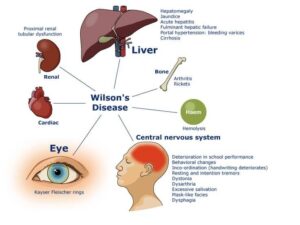Liver Diseases
The liver is a vital organ responsible for detoxification, metabolism, and digestion. However, various liver diseases can affect its function, leading to serious health complications if not detected and treated early.
Liver Diseases we expertise in

Wilson’s disease (WD)
Wilson’s disease (WD), is a rare genetic disorder that affects the body’s ability to metabolize copper. In healthy individuals, copper present in the food is absorbed and then excreted in bile or incorporated into proteins, such as
ceruloplasmin, for various bodily functions.

Hepatitis
“Hepatitis” means inflammation of the liver, caused by heavy alcohol use, toxins, medications, and medical conditions. It is most commonly caused by a virus, with Hepatitis A, B, and C being the most
common types.

Biliary atresia
Biliary atresia is a rare and life-threatening condition that affects bile ducts present inside and outside the liver in infants. It is characterized by the blockage bile ducts, which prevents bile—a digestive fluid produced by the liver—from flowing into the small intestine.